As Healthy Harvest fulfills its mission to connect and educate in support of the local food system, there are many projects underway all across North Iowa. We are excited about North Iowa’s local food movement and invite you to get involved if you are not already. If you have a question or a connection you’d like to share, please contact us.
To sign up for our e-newsletter, click here.
Consumers: Summer Recipes and Little Locavores Virtual Learning
Summer is here and farmers are busy preparing food for your table. Check out our Summer Recipes and find your local market or reach out to a farmer to find what you need! Below are a few updates:
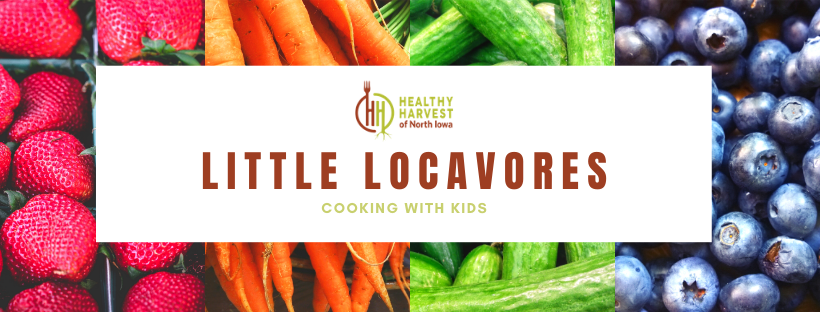 Little Locavores Virtual Learning
Little Locavores Virtual Learning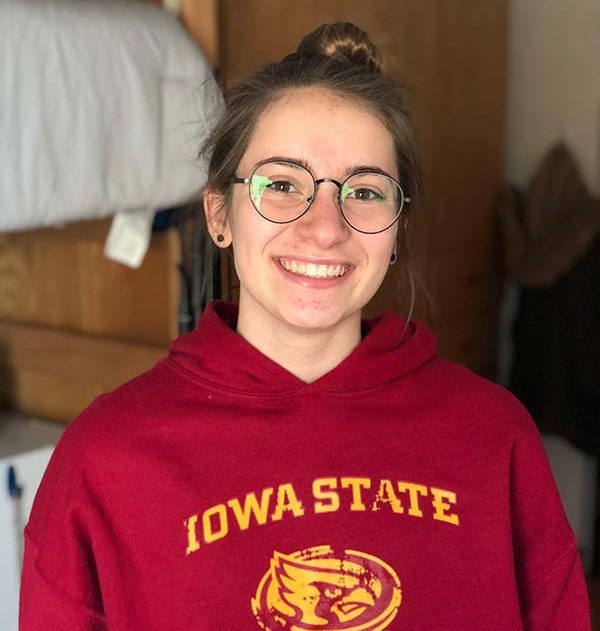
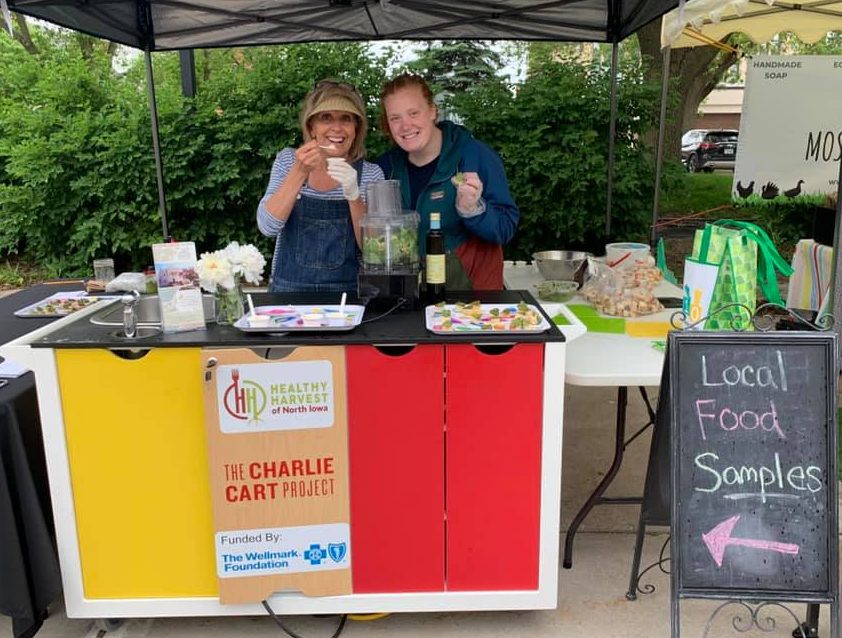 Natalie McMillan: Hi everyone! My name is Natalie McMillan and I will be a senior at Iowa State this coming fall. I grew up on a farm in Aurora, Iowa where I was blessed with the opportunity to raise my own livestock and have my own garden. These experiences sparked my passion for both food and agriculture which led me to Iowa State where I am majoring in Culinary Food Science. This will be my second summer with Healthy Harvest of North Iowa and I can’t wait to get started. Last summer I was able to connect with so many great producers and consumers and I am so excited to be back. I’m looking forward to making and sharing more exciting recipes with you all. When I’m not doing schoolwork or working, you can find me testing new recipes, going on walks with my two dogs, or watching a good movie. One favorite local food of mine is Bagge Strawberries from Independence, Iowa. They have the absolute best strawberries that I love to freeze and use year round in smoothies, pies, and more. I’ve had a great start so far with HHNI and I can’t wait to see where this summer will take me!
Natalie McMillan: Hi everyone! My name is Natalie McMillan and I will be a senior at Iowa State this coming fall. I grew up on a farm in Aurora, Iowa where I was blessed with the opportunity to raise my own livestock and have my own garden. These experiences sparked my passion for both food and agriculture which led me to Iowa State where I am majoring in Culinary Food Science. This will be my second summer with Healthy Harvest of North Iowa and I can’t wait to get started. Last summer I was able to connect with so many great producers and consumers and I am so excited to be back. I’m looking forward to making and sharing more exciting recipes with you all. When I’m not doing schoolwork or working, you can find me testing new recipes, going on walks with my two dogs, or watching a good movie. One favorite local food of mine is Bagge Strawberries from Independence, Iowa. They have the absolute best strawberries that I love to freeze and use year round in smoothies, pies, and more. I’ve had a great start so far with HHNI and I can’t wait to see where this summer will take me! 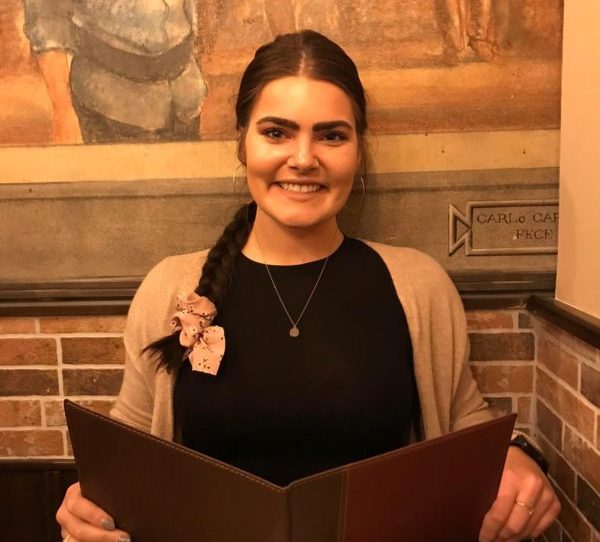 Rachel Wirtz: Hello, my name is Rachel and I’m from North Central Iowa. I recently graduated from Iowa State with a degree in Business Management but my passion is all things cooking and hosting! I love trying and creating new recipes and hosting dinners for large groups. I love summer because it means fresh veggies, homemade ice cream, and grilling! I’ve always wanted to own my own business and it would entail a brunch/retail shop mixed floral, coffee, and fashion. I also love traveling anywhere and everywhere, especially overseas! I recently got golden doodle puppy, Peaches, and I couldn’t be happier! My favorite local veggie is asparagus (when it’s in season of course). I love it because it feels like a treat when it’s in season because it’s only for a short time! Another reason I love it is the fact that you can cook it so many different ways and it pairs well with everything! There’s nothing better than fresh harvested asparagus!
Rachel Wirtz: Hello, my name is Rachel and I’m from North Central Iowa. I recently graduated from Iowa State with a degree in Business Management but my passion is all things cooking and hosting! I love trying and creating new recipes and hosting dinners for large groups. I love summer because it means fresh veggies, homemade ice cream, and grilling! I’ve always wanted to own my own business and it would entail a brunch/retail shop mixed floral, coffee, and fashion. I also love traveling anywhere and everywhere, especially overseas! I recently got golden doodle puppy, Peaches, and I couldn’t be happier! My favorite local veggie is asparagus (when it’s in season of course). I love it because it feels like a treat when it’s in season because it’s only for a short time! Another reason I love it is the fact that you can cook it so many different ways and it pairs well with everything! There’s nothing better than fresh harvested asparagus!Be sure to check out our recipe database that feature local products on our website. See a sample below:
Basic Green Salad with Vinaigrette
INGREDIENTS
- 1 cup extra-virgin olive oil (best quality you can afford)
- 4 to 5 tbsp red wine vinegar
- 1/2 to 1 tsp salt
- 1 to 2 cloves garlic*, minced
- a mixture of 2 or more greens (arugula*, leafy lettuce*, head lettuce*, romaine*, spinach*, endive*, radicchio*, etc) (ask your farmer what’s growing right now!)
- customize your dressing by experimenting with various additions such as: lemon, minced herbs*, dijon mustard, mayo, shallots*
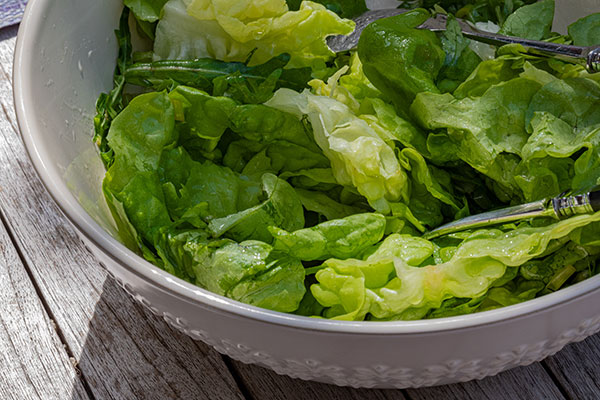
INSTRUCTIONS
- Prepare the vinaigrette. Combine oil, vinegar, salt, and garlic in a jar. Cover tightly with a lid and shake well. Refrigerate until ready to use (lasts a couple weeks!).
- Prepare the greens: Rip all the greens into small pieces with your hands. Knives, even nylon lettuce knives, are likely to bruise your greens. Put into a colander or basket of a salad spinner and rinse very well. Soak if very dirty, then rinse thoroughly. Dry in salad spinner and/or by shaking colander. Dry again with paper towels. You want very, very dry greens.
- Test your dressing: use a clean, dry leaf and dip it into your dressing and taste. Adjust salt, pepper, and vinegar as needed.
- Put greens into a large bowl. Begin gently pouring some of the dressing on top of the greens and use your hands to gently coat the greens until they are evenly covered. Reserve your dressing for future greens!
Yield: Large bowl of salad
As the regular growing season comes to end, Mallory is looking forward to the “off-season” to focus on planning out programing for 2020, including new cooking classes for kids and adults – so keep an eye out for those!
Producers: NI Local Food Connection Update
The growing season is a busy time for farmers, therefore our educational programing takes a break, and we shift our focus to our Summer Field Day series. As with our other programing, we have moved our field day series virtual due to concerns around COVID-19. These field days give you an inside look into their farms, the practice that goes into growing/raising their product, and fun projects they are working on.
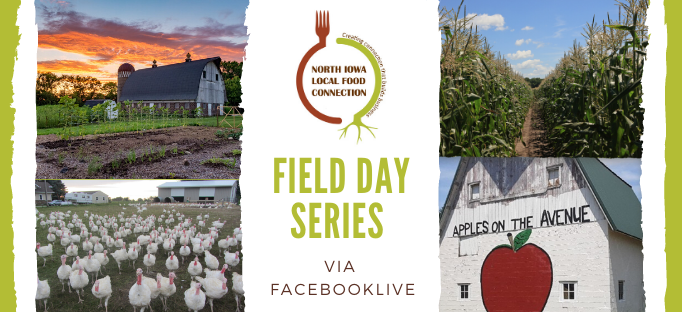
We welcome you to join us at any of the following events and/or watch the recordings on our Facebook page.
- Sun. June 14 at 2:00 – 3:00pm – Virtual Field Day at Apples on the Avenue
- Sat. July 18 at 2:00 – 3:00pm – Virtual Field Day at The Thomas Farmstead
- Sat. August 8 at 2:00 – 3:00pm – Virtual Field Day at Honey & Ewe
- Sun. August 30 22 at 2:00 – 3:00pm – Virtual Field Day at Steve’s Sweet Corn
For updates on this programing, join the North Iowa Local Food Connection group on Facebook. The recording of our off-season Farming the Web marketing workshop can be found on our website.
Support in 2020 for the NI Local Food Connection program comes from a partnership with Practical Farmers of Iowa’s USDA Beginning Farmer Rancher Development Grant.
Communities: Curbside Market comes to Two Local Farmers Markets
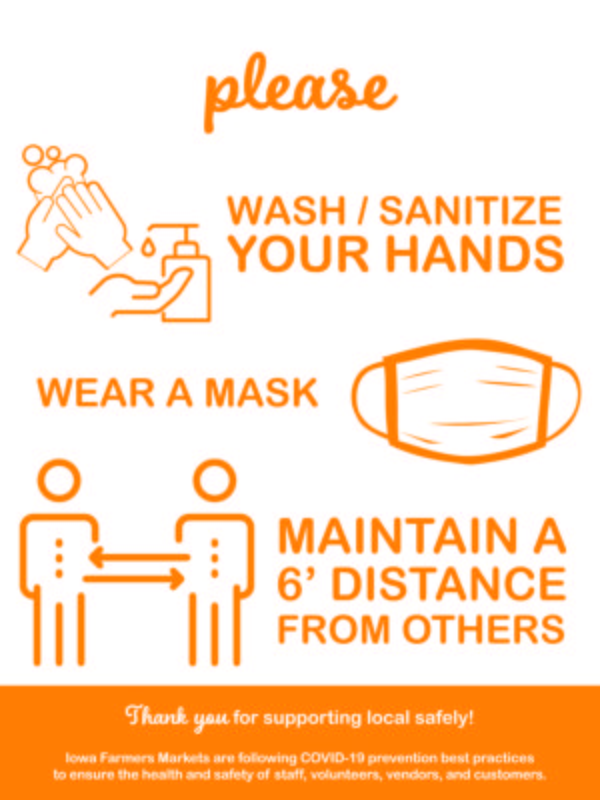
It’s farmers market season – and we are happy to report that all local markets have opened for the season, thanks to the Governor’s recognition of our farmers markets as an essential place to access fresh, local food and farm products. This season has witness some additional safety precautions, so when heading to the market, please be prepared to wear a mask, wash and/or sanitize your hands, maintain 6-feet of distance from other people (example: “Point and Pick” your products) and leave your re-useable bags at home. You will also notice an increase distancing of vendors and a lack of additional programing such as music, in-person kids activities, and samplings.
Pivoting in 2020 has become the norm, and we are thankful for our partners who are creative and supportive of promoting safety for our communities. The North Iowa Farmers Market is featuring their PoP (Power of Produce) kids program as a to-go program, where kids register online and then stop by the PoP booth to pick up their two-bite challenge and a weekly activity, paired with an online recipe video from our Healthy Harvest contractors.
 We are also proud to share the launch of Curbside Market – an online farmers market experience with curbside pick-up for the farmers markets in Clear Lake and Mason City. This pilot program is made possible by the support of a USDA Farmers Market Promotion Program grant, and partnership with the University of Northern Iowa, North Iowa Fresh, and four local farmers markets in North Iowa. We very much encourage you to shop what is available each week, and enjoy the ease of a quick and easy pick-up process every Tuesday 4-6pm in Mason City and Saturday 9am – 12pm in Clear Lake. Click here to learn more and to become a Curbside Market customer.
We are also proud to share the launch of Curbside Market – an online farmers market experience with curbside pick-up for the farmers markets in Clear Lake and Mason City. This pilot program is made possible by the support of a USDA Farmers Market Promotion Program grant, and partnership with the University of Northern Iowa, North Iowa Fresh, and four local farmers markets in North Iowa. We very much encourage you to shop what is available each week, and enjoy the ease of a quick and easy pick-up process every Tuesday 4-6pm in Mason City and Saturday 9am – 12pm in Clear Lake. Click here to learn more and to become a Curbside Market customer.
Regional Partnerships: The NI Food Coalition
Our Spring meeting will highlight a conversation on Food Waste, Recovery, and Donation in North Iowa, and provide time for project team updates. Our meeting will be held a Zoom Call – open to all who are interested in discussing current happenings for local food in North Iowa! Plus we’d LOVE to hear your local food updates and questions!
As many of you know, the Coalition is a great way to stay engaged in our local food system, including participating in our five priority project teams: Community Gardens, Farm to School, Farmers Market, Food Waste, and Market Development (formally Food Hub). See brief updates from our teams below.
Community Gardens Team – This “team” is still in search of a leader, but until then, we’d like to highlight a local garden doing some great work. The Worth County Fairgrounds’s 4-H Garden engages fourteen youth in their own garden plots, as well as the hope to harvest vegetables out of an additional nine garden plots that could be dedicated and donated to our local Worth County “MANNA” Food Pantry to be shared with families in need. One of their Worth Co. 4-H members, Kate Groe, is raising 200 broiler chickens that she will be marketing to individuals and sharing with friends in her community.
Below are some photos and testimonies of the Worth County youth garden experiences:
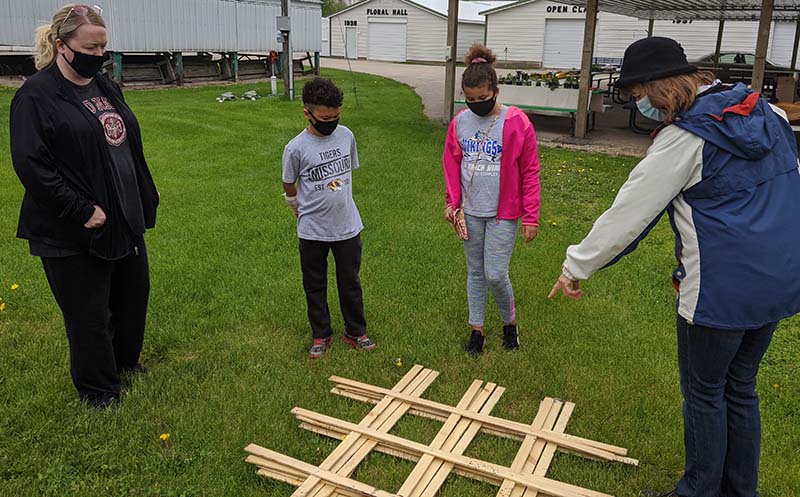
Worth County 4-Her’s are receiving garden planting instructions from ISU Extension Master Gardener and 4-H Garden Project Leader Janelle Johnson on the right. Pictured from left are 4-H parent Amy Brown, Linca Scarlett, Layla Scarlett, and Johnson.
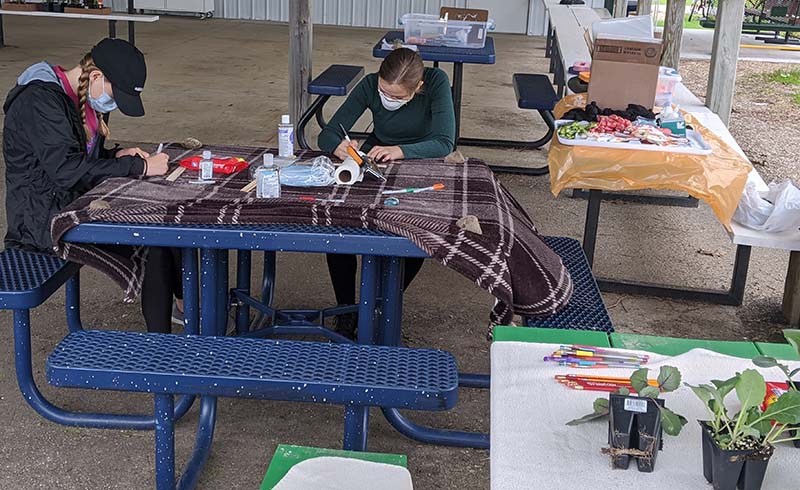 Emily Hannemann on the left and Merrin Hanson on the right, 4-H members of the Hartland Achievers 4-H Club lay out plans and mark locations on their map for their 4-H vegetable garden plots.
Emily Hannemann on the left and Merrin Hanson on the right, 4-H members of the Hartland Achievers 4-H Club lay out plans and mark locations on their map for their 4-H vegetable garden plots.
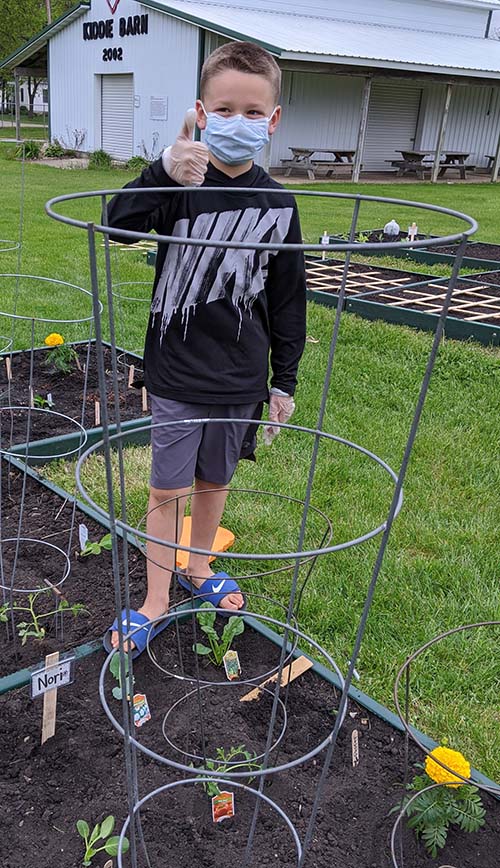
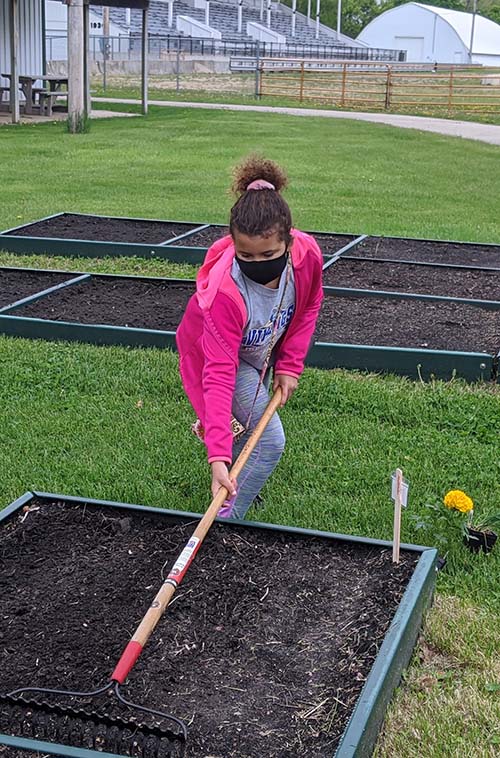 Left: First time 4-H vegetable gardener, Graham Holstad proudly displays his tomato cage he installed in his garden plot at the Worth County Fairgrounds.
Left: First time 4-H vegetable gardener, Graham Holstad proudly displays his tomato cage he installed in his garden plot at the Worth County Fairgrounds.
Right: Layla Scarlett a member of the Grove Progressive 4-H Club tills her garden plot to make ready for her vegetable garden planting she and her brother Linca did on May 21st.
Bottom: Worth County 4-H Garden Project Leader, Janelle Johnson supervises young gardeners Veda Waller on the left and Silas Waller on the right as they aggressively do tillage work prior to planting their 4-H Garden plots on the Worth County Fairgrounds.
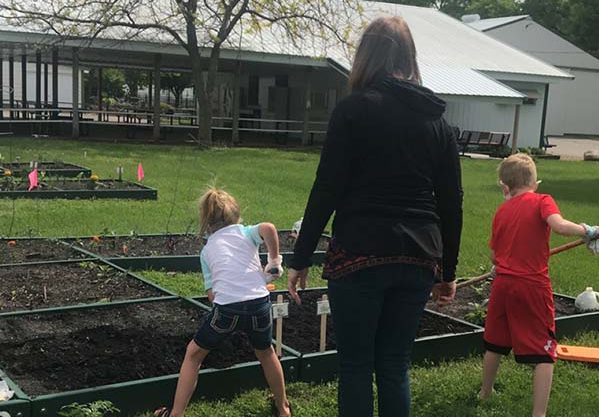
Farm to School Team – The team continues to await news on their USDA Farm to School Implementation grant application, and among COVID-19 impacting schooling, yet school gardens continue to have great energy.
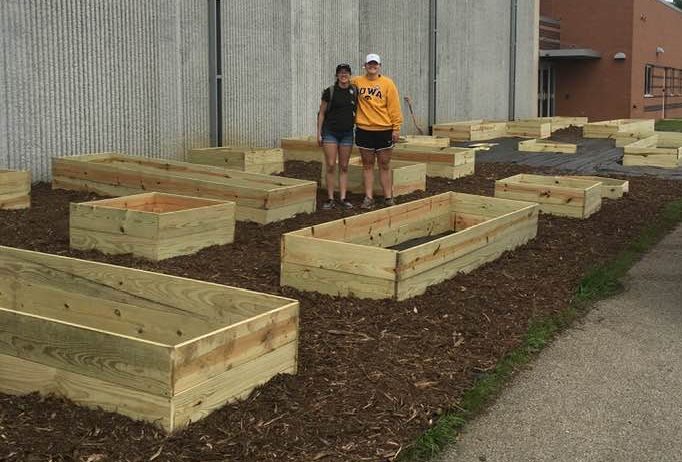
The Summer Garden Clubs have started in Sheffield and Hampton, with an impressive expansion of the school garden at the Hampton Middle School, thanks to the support of the Franklin County Extension Office and their AmeriCorps members. CAL Community School Farm has a new leader, Jill Craighton, who is carrying the baton over from Steve Lane and his inspiring dedication to launching the program. Jill recently shared the update of getting the crops into the gardens, chickens in the coop, and a new goat on the farm! Excited to see the bounty out of these
If you’d like to get involved as a volunteer on these gardens, we recommend reaching out to your local school district to learn more. If you’re interested in getting involved in our Farm to School Project Team efforts, contact Michelle Sackville, ISU Extension – Franklin County.
 Farmers Market Team – Our local markets weathered the initial impacts of COVID-19 by opening on-time, but with several additional precautions including masks, hand-sanitizer, “point-to-pick” shopping, extra distance between vendors, and a limit on the type of vendors/no extra activities. Through all that, the growing season continues, and the bounty from the fields have begun to roll in, bringing greens, radishes, asparagus, and other key staples like baked goods, honey, eggs, meats, and more! A special shout-out to all the volunteers and vendors out there who make these markets possible, especially amidst these especially trying times.
Farmers Market Team – Our local markets weathered the initial impacts of COVID-19 by opening on-time, but with several additional precautions including masks, hand-sanitizer, “point-to-pick” shopping, extra distance between vendors, and a limit on the type of vendors/no extra activities. Through all that, the growing season continues, and the bounty from the fields have begun to roll in, bringing greens, radishes, asparagus, and other key staples like baked goods, honey, eggs, meats, and more! A special shout-out to all the volunteers and vendors out there who make these markets possible, especially amidst these especially trying times.
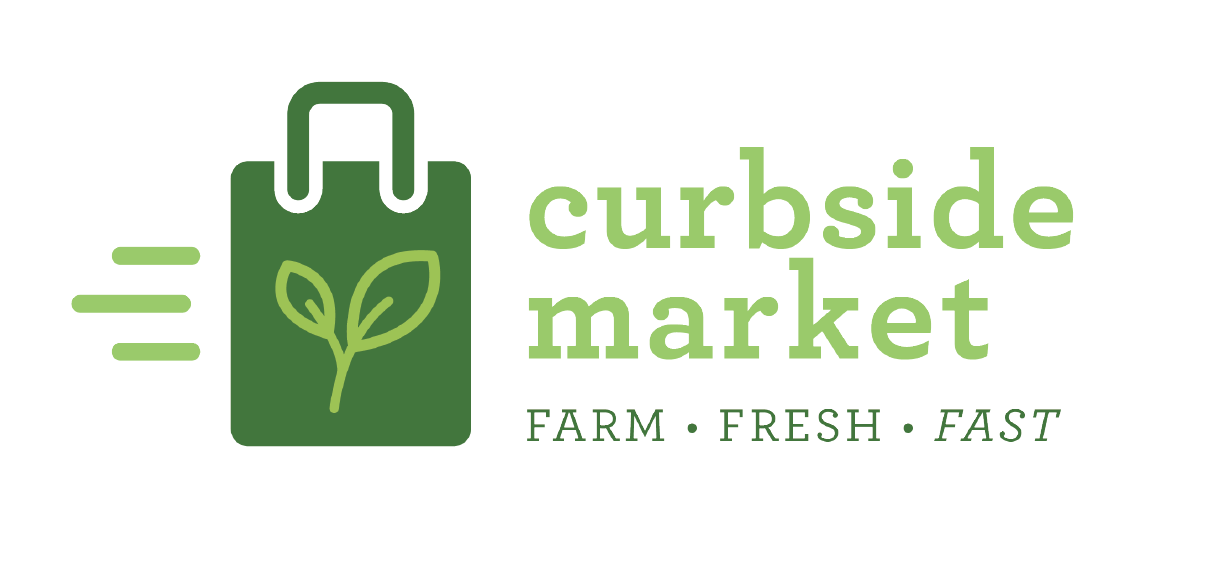 We’re heard great reports from the early weeks of market in Osage, Charles City, and Forest City – which is a promising boost to our local economies. A few programs you can look for at the markets in Mason City and Clear Lake are a new ‘Curbside Market‘ online ordering system with curbside pick-up, a new Double-Up Food Bucks pilot (starting in July), and an adapted PoP Club (Power of Produce) for kids with a grab’n’go pick-up option. While activities at markets are limited, there’s still lots of great innovation at these markets to keep customers engaged and excited about local offerings!
We’re heard great reports from the early weeks of market in Osage, Charles City, and Forest City – which is a promising boost to our local economies. A few programs you can look for at the markets in Mason City and Clear Lake are a new ‘Curbside Market‘ online ordering system with curbside pick-up, a new Double-Up Food Bucks pilot (starting in July), and an adapted PoP Club (Power of Produce) for kids with a grab’n’go pick-up option. While activities at markets are limited, there’s still lots of great innovation at these markets to keep customers engaged and excited about local offerings!
If you are involved in a market that wants to collaborate with others and/or want to be connected into what’s happening, contact Marie to get involved this with this!
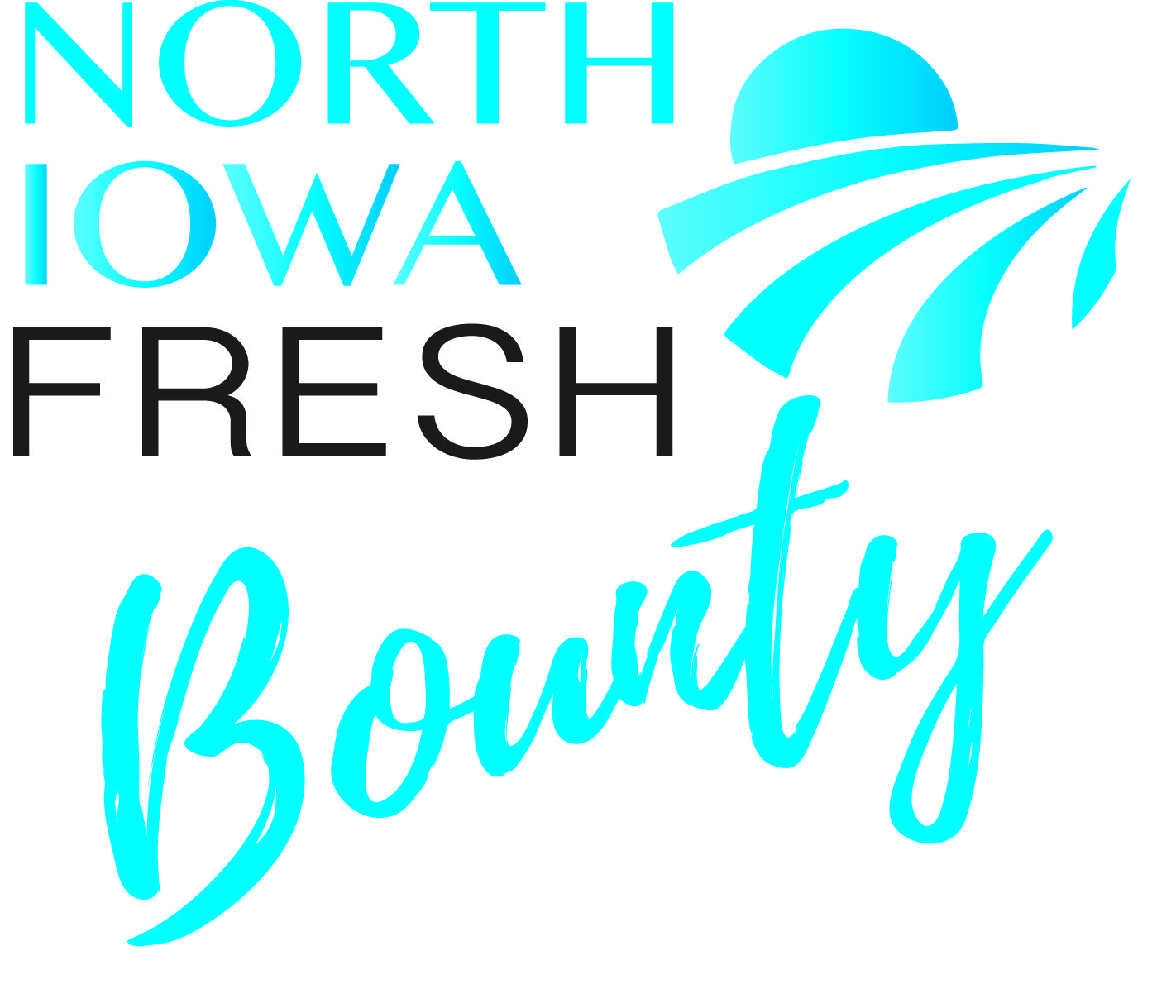 Market Development (Formally Food Hub) Team – North Iowa Fresh (NIF) begun the season for it’s Bounty Box Program (a weekly fruit/veggie multi-farm CSA with optional add-ons like meat, breads, honey, etc). They have added additional drop sites this year in the Sheffield/Hampton and Forest City areas, as well as their existing routes to Mason City, Clear Lake, Garner, Belmond, and Clarion. They have also begun a partnership for distribution of fresh veggies to the Hawkeye Harvest Food Bank in Mason City, and are partnering with HHNI to pilot Curbside Market utilizing the NIF order platform.
Market Development (Formally Food Hub) Team – North Iowa Fresh (NIF) begun the season for it’s Bounty Box Program (a weekly fruit/veggie multi-farm CSA with optional add-ons like meat, breads, honey, etc). They have added additional drop sites this year in the Sheffield/Hampton and Forest City areas, as well as their existing routes to Mason City, Clear Lake, Garner, Belmond, and Clarion. They have also begun a partnership for distribution of fresh veggies to the Hawkeye Harvest Food Bank in Mason City, and are partnering with HHNI to pilot Curbside Market utilizing the NIF order platform.
Learn more on their website or reach out to Andrea Evelizer, Broker for North Iowa Fresh, LLC. Note: this ‘team’ is looking to expand into more of a general conversation around market development in North Iowa – so if you are interested – shoot us a note to info@healthyharvestni.com.
Food Waste Team – Members of this team led our Spring quarterly meeting on June 16th, with brief presentations from ISU Extension and Outreach FFED’s Linn County Food Donation and Recovery Assessment, Eat Greater Des Moines and their food recovery work, NETZRO, SBC’s Upcycled Food Program, Clear Lake food donation project between the farmers market and the local food bank, Charles City FFA’s donation gardens, North Iowa Fresh, LLC new distribution to Hawkeye Harvest Food Bank, and Healthy Harvest of North Iowa Recipe Cards and ”How to” Video demos that can distributed alongside these efforts. The meeting was filled with inspiring information and connections made between partner organizations. Catch the recording of this meeting below:
Since this meeting, there has been conversation around building a volunteer gleaning program in North Iowa. Gleaning is “the act of collecting leftover crops from farmers’ fields after they have been commercially harvested or on fields where it is not economically profitable to harvest.” This is a great way to bring volunteer into the fields of local farms, recovering the food into use into the homes of North Iowans.
To get involved in these efforts, reach out to Sarah DeBour at Cerro Gordo Extension, Sue Marshall at NetZro or Mike Yore at Sodexo.
Producer Profile Highlight

We recently caught up with Darin and Arlene Enderton, from Apples on the Avenue, on their Virtual Field Day, but to get some additional insight into their operation and what farming means to them, read more about their farm below:
How do you describe your farm? Apples on the Avenue Orchard is a work in progress and it is our home. The orchard was started in the 1970s, but prior to our purchase it was closed for a few years. We have been working to bring the trees back to health, restore the buildings, and build the business back up. We are constantly trying out new things, such as having sheep and a cow to help us keep it mowed, and are trying to figure out how to best manage the orchard while raising our family. The orchard is a place where anyone can come with their family and spend a few hours picking apples, watching the animals, or playing outside. We try not to put on a show for people, but we do make our farm available for them to enjoy.
When did your farm get started? The orchard was planted in 1974, and we purchased it in 2014.
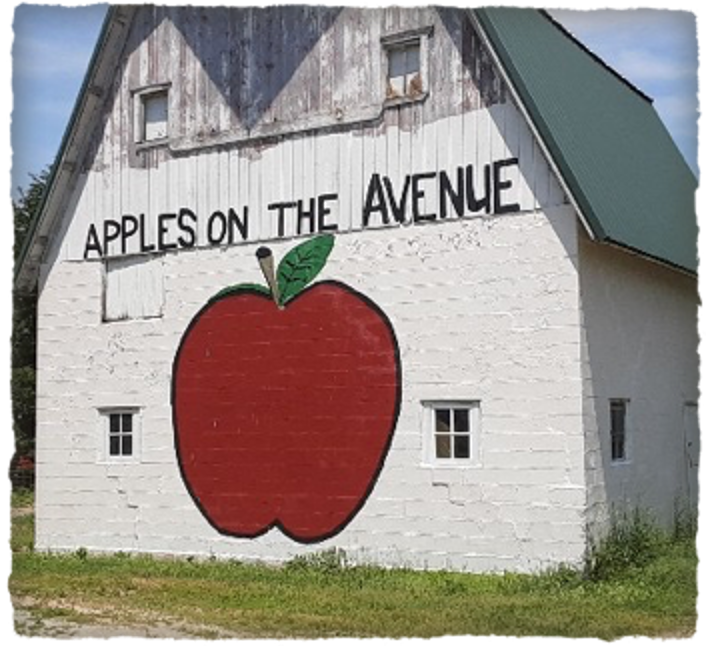 Why did you start your operation? We loved the idea of working together on a farm, raising our children in a rural community, and operating a local business. While not all of our initial expectations have been met, we do enjoy seeing our customers year after year and giving them really good customer service.
Why did you start your operation? We loved the idea of working together on a farm, raising our children in a rural community, and operating a local business. While not all of our initial expectations have been met, we do enjoy seeing our customers year after year and giving them really good customer service.
What is your vision for your farm? We want our farm to be the type of place where our customers can come out and feel like they are at home. It’s not perfect and we aren’t putting on a show. It’s a real farm with a real family living on it and doing their best to produce a good product.
What is the biggest success you have found on the farm?Our newer block of trees, which Darin calls the “Poppe block” (named after Maddie Poppe). Contrary to convention, Darin transplanted potted trees into this block, as opposed to “whips,” or small bare root trees which are usually planted in orchards. He is supporting the trees with a temporary trellis, which he built using pre-used materials. Darin has learned that supporting the trees it has helped them get established more quickly and fewer of the trees have died in comparison to whips that we have planted in the past.
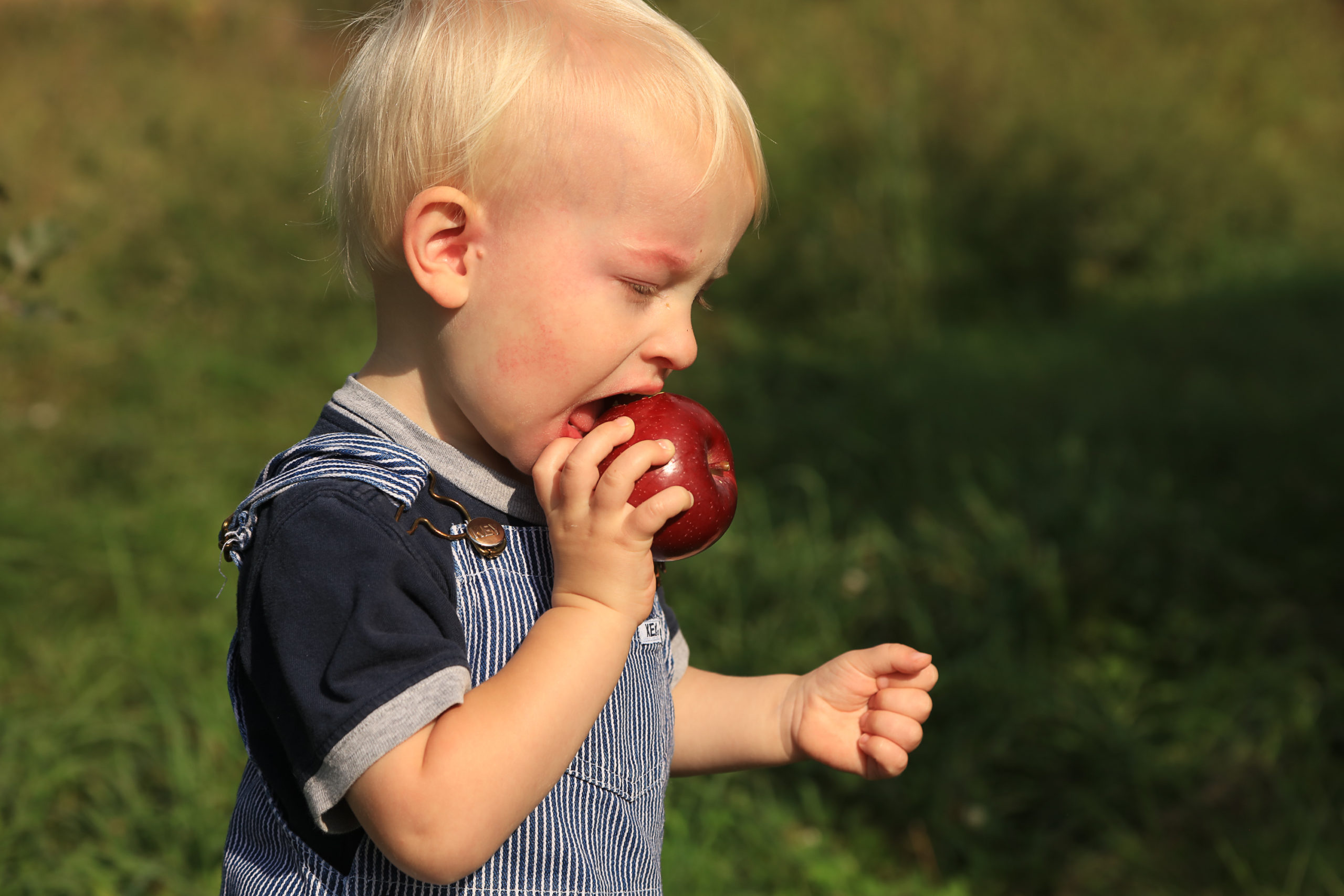 What is the biggest barrier(s) you have encountered? Operating in orchard has been much more challenging than we expected. It’s hard to limit the barriers to just one or two. However, our major barriers have been finding equipment that we can afford and that actually works for us, marketing, and the overwhelming amount of labor required to maintain the orchard and sell apples while raising our young family.
What is the biggest barrier(s) you have encountered? Operating in orchard has been much more challenging than we expected. It’s hard to limit the barriers to just one or two. However, our major barriers have been finding equipment that we can afford and that actually works for us, marketing, and the overwhelming amount of labor required to maintain the orchard and sell apples while raising our young family.
What, if anything, has helped your business attempt to overcome challenges? We have cut our fall hours back to four days a week, whereas in the past it had been six days a week. That definitely helped. We have also partnered strategically with others to get the work done. For example, when we planted 2 1/2 acres of Chestnut trees a neighbor worked up the ground for us and planted the ground cover at his own expense. In exchange, he cuts hay on the ground, so we don’t have to mow it and he gets the hay for his livestock. We also exchange labor with other farmers, which has been a big help. We sell products in our on farm store from other local farmers (honey, maple syrup, pumpkins baked goods), which provides them with another market and gives our customers better selection. It is a win for everyone.
What advice would you offer anyone looking to get started in local food farming? Any type of farming is difficult work, and there are many easier ways to make money. Think of farming as a lifestyle first, so ask yourself if you want to do the daily work of farming that sometimes intrudes into other things that you’d like to do, and ask yourself if you want to do this for little monetary return. If yes, you could be a farmer.
Ideally, find a number of farms doing something similar to what you would like to do, and ask a lot of questions about how they do things- how they spray, get the grass mowed, how they harvest and handle their harvest afterwards. You could attend field days on the farms as a start, and then make direct connections with the farms for visits throughout the year.
Invest in good equipment from the start. For too long we tried to get by with old equipment, because that was what was affordable, but spent way too much time fixing equipment and not getting our work done.
Ultimately, any local food producer writes their own job description each day and for the long-term. Some customers may have expectations that you can’t meet, or won’t be able to meet for the long-term. Do what works for you to stay healthy in the long-term.
Do you have any resources you would like to recommend?
- Profit First by Mike Michalowicz – As a very short summary, this book tells business owners to set aside money for themselves, instead of putting it all back into the business, because the business will keep wanting more, and more, and more. Putting some money aside leads people to make better decisions in the end.
- Midwest Tree Fruit Spray Guide & Midwest Fruit Pest Management Guide. Both of these are compiled by land-grant universities in the Midwest and are excellent sources for growing fruit.
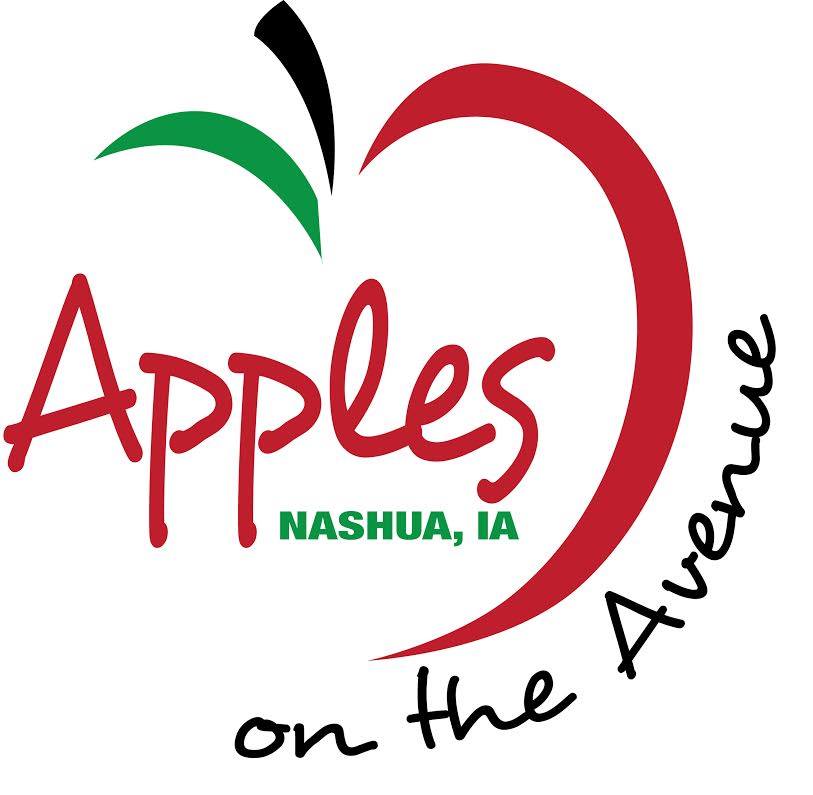
Any parting words that you’d like to share with the local food/farm community? For those farming, keep track of progress that you make each year, and celebrate all of the ways that you improve your farms. Take time to appreciate all that you’ve learned from those mistakes or breakdowns that might have been so frustrating in the moment.
I hope that local food consumers can appreciate the good what local food farmers do in their communities, and how they add diversity to the Iowa landscape.
Reach out to Apples on the Avenue:
- Phone: (641) 210-5506
- Email: applesontheave@gmail.com
- Facebook: @applesontheavenue
- Open Seasonally: August by appointment; Labor Day- Halloween: Tues.- Sat. 10AM – 6PM, Sundays 1PM-6PM
- 3035 Addison Blvd, Nashua, IA 50658
- www.applesontheavenue.com
Become a Member of Healthy Harvest of North Iowa
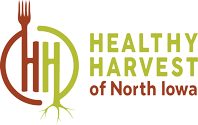 Like what you see here? Consider becoming a member of Healthy Harvest of North Iowa to ensure our work to connect and education in support of the local food system continues! Memberships start at just $50 a year, and come with some benefits and ways to stay connected to the action. Click here to learn more….
Like what you see here? Consider becoming a member of Healthy Harvest of North Iowa to ensure our work to connect and education in support of the local food system continues! Memberships start at just $50 a year, and come with some benefits and ways to stay connected to the action. Click here to learn more….





